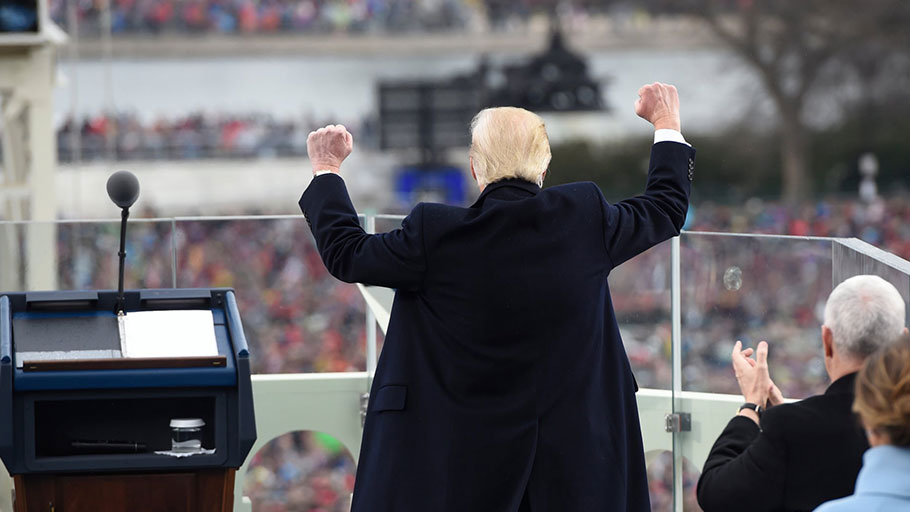‘American carnage’: Donald Trump began his presidency with apocalyptic rhetoric. How has the reality been? Photograph: Pool/Getty Images
The republic has undergone a wild stress test but despite new lows, Donald Trump’s presidency has also seen a democratic renaissance
By David Smith, The Guardian —
It’s nearly half-time and we’re still here. On 20 January it will be two years since the businessman and reality TV celebrity Donald Trump took the oath as president, spoke of “American carnage” and boasted about his crowd size, leaving millions to wonder if the US, and the world, could survive him.
It will also be two years until the next inauguration in Washington. Has the 45th president kept his campaign promises and made America great again? Or has he proven an existential threat to the republic, stoking internal divisions, destroying its reputation abroad and assailing norms and values, the rule of law and reality itself?
For sure, Trump is testing his infamous January 2016 claim – “I could stand in the middle of Fifth Avenue and shoot somebody, and I wouldn’t lose any voters” – to destruction.
True, there has been no new war, no major terrorist attack, no economic crash – at least not yet – such is the soft bigotry of low expectations. There is also a school of thought that this presidency was necessary, that the rise of a narcissistic authoritarian has brought about a moment of reckoning, forcing white Americans to confront a racism many had dismissed as ambient noise and forcing everyone to confront a broken politics.
“There’s no question that the institutions of our democracy are being tested every day in terms of the fundamental checks and balances built into our constitution,” said Leon Panetta, a former defence secretary and CIA director. “There are some days when you wonder whether the system is going to work well, but I think generally we’ve been able to survive. But presidencies ought to be about a hell of a lot more than just survival.”
Bill Galston, a senior fellow at the Brookings Institution thinktank in Washington and former policy adviser to President Bill Clinton, agrees: “America is surviving; it isn’t thriving. Our institutions have undergone a stress test. They have bent; they haven’t broken.”
Most observers agree that Trump has remained true to himself and his candidacy, the anti-Barack Obama. Last month he awarded himself an A+, asking on Fox News: “Is that enough? Can I go higher than that?”
Trump presides over a strong economy with unemployment at its lowest rate for half a century, though Democrats argue that he is building on Obama’s foundations and warn of a spiralling national debt. He passed sweeping tax reform in what critics say was a giveaway to the super-rich at the expense of working families. He slashed regulations with little heed for the environment (he denies the science of climate change).
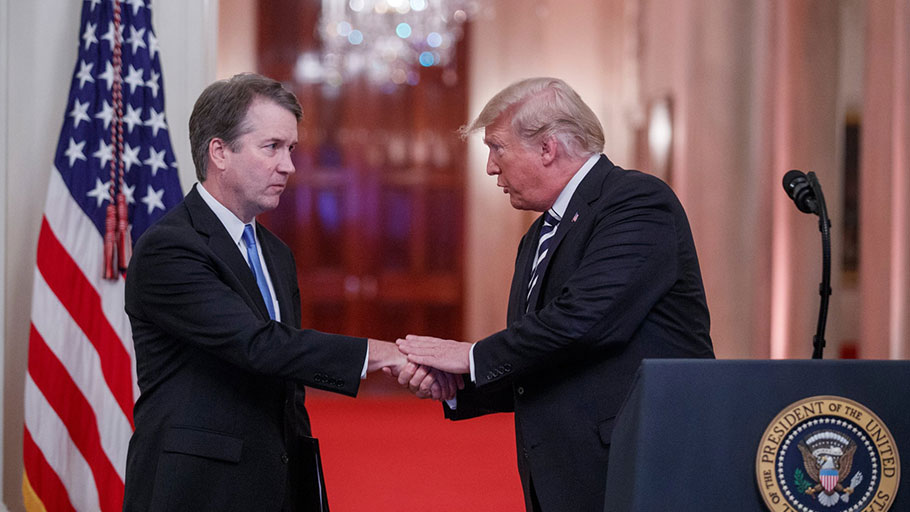
Donald Trump’s nomination of Brett Kavanaugh to the supreme court was part of a major conservative reshaping of the federal judiciary. Photograph: Shawn Thew/EPA
He appointed Neil Gorsuch and Brett Kavanaugh to the supreme court, and many more conservative judges to the lower courts, delighting his base but infuriating millions of women and men after allegations of sexual assault against Kavanaugh were brushed aside. He has failed to build the wall he promised on the Mexican border but enforced an anti-immigration policy that separated children from their parents.
Overseas, Trump has praised authoritarians while alienating old allies and rattling the post-second world war liberal order. His relationship with the Russian president, Vladimir Putin, remains a mystery, exemplified by a summit in Helsinki that led to cries of treason, but special counsel Robert Mueller has caught several criminals in Trump’s orbit and has cast a long shadow over the White House. Trump’s trade war with China could hurt the people who elected him the most.
Larry Jacobs, director of the Center for the Study of Politics and Governance at the University of Minnesota, says: “Trump is squandering one of America’s greatest strengths, which is its allies. Stand back and say, is America more powerful than when he got elected in 2016? The answer has to be no. There has been only slippage.”
Along the way, the Republican party has done little to stop him, with most critical voices in the Senate – John McCain, Bob Corker, Jeff Flake – stilled by death or retirement. Even so, Jacobs retains faith in the country’s resilience. He said: “I’m not one of those people who think American democracy is ending. This is not a late-night horror movie. This is a country that had hundreds of years of democracy with a civil war, the McCarthy hearings and a lot more. The country has been through the wringer and democracy has held.
“When I look at the performance of institutions, I’d say it’s largely operational. The media has been described as the enemy of the people but the press looks more vibrant and aggressive in its reporting than at any time since Watergate. Trump is an aberration in his conduct but the operation of the American electoral system, judiciary and media continue.”
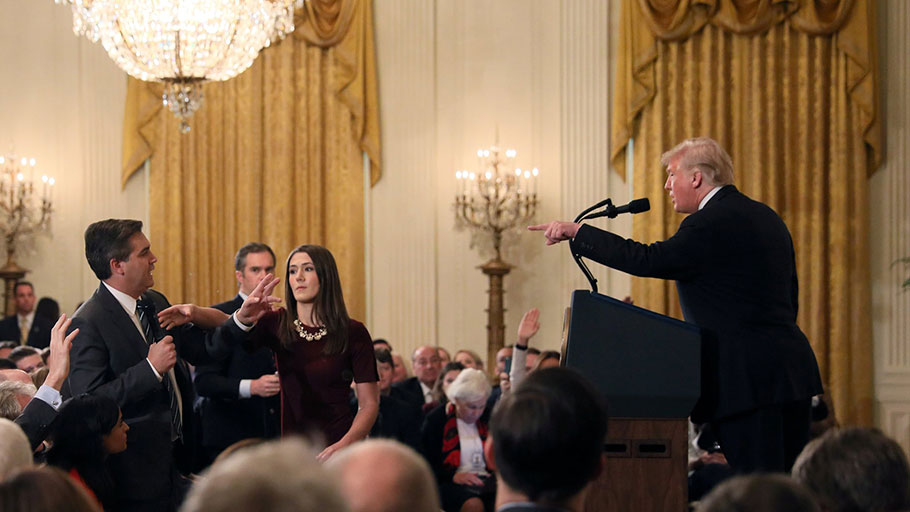
Trump confronts the CNN correspondent Jim Acosta. The president has regularly accused the media of being the ‘enemy of the people’. Photograph: Jonathan Ernst/Reuters
Trump also provokes questions of character, ethics and temperament. His White House has been a vortex of chaos with a record turnover of staff. He surrounded himself with ageing white men and members of his own family, inviting accusations of corruption. He drew moral equivalence between white nationalists and anti-fascist protesters after deadly violence in Charlottesville, Virginia, and appears to reserve particular venom for women and people of colour. He has attacked the media as “the enemy of the people” while chalking up thousands of false statements. His Twitter account brims with insults, lies, vulgarity and bad spelling.
Sidney Blumenthal, a biographer of Abraham Lincoln, says: “Trump is certainly the person with the worst character ever to be president. At two years and counting, the damage may equal the damage done by the worst presidents which brought on the civil war, and the damage done by Andrew Johnson who encouraged the Ku Klux Klan and white nationalist attacks on Reconstruction that brought about legalised segregation.”
Blumenthal, a former senior adviser to Clinton, warns that even if Trump – who lost the popular vote in 2016 and saw House Republicans routed in 2018 – is defeated in 2020, his legacy will endure. “The idea that there can be a simple restoration and the country can pick up where we left off the minute before Trump took the oath is a dangerous illusion. We’re going to have to deal with the damage. It is too profound that it is an unprecedented assault on our constitution.”
And yet there is a striking paradox. Over the past two years, Trump has also caused a democratic renaissance. The first Women’s March on Washington the day after his inauguration was probably the biggest single-day demonstration in recorded US history, with an estimated 725,000 people. In November 2018, 49% of the voter-eligible population showed up at the polls, the highest midterm turnout seen since 1914. Activists, authors, journalists and satirists have thrived in an age when politics suddenly matters again. The complacent myth of a post-racial country, which some espoused after Obama’s election, has been exploded, forcing some long-overdue conversations.
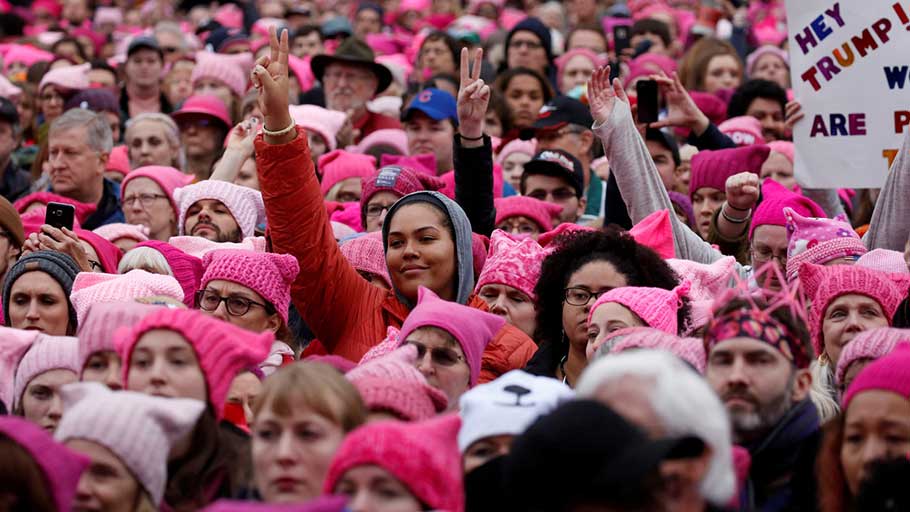
The Women’s March in Washington on 21 January 2017 was part of a flowering of democratic dissent. Photograph: Shannon Stapleton/Reuters
Asked if he considers Trump a white supremacist, Rashad Robinson, president of the advocacy group Color of Change, replies instantly: “Absolutely.” But he adds: “If Trump was the only one, he couldn’t survive. There is potential for us to be more honest and more clear and see what people do when things are hard. When you’re getting your tax breaks and your judges, are you willing to go along with racism?”
The president has shaken up norms once taken for granted, he adds. “Trump and the right have sort of called the bluff on those things where we thought the system was supposed to work: you can’t steal a supreme court seat, you can’t say racist things to a black female reporter, you can’t lie every day and get away with it. The bluff has been called and we can’t rely on the old structures and rules of cordiality.”
But the “resistance” to Trump has produced a surge of civic activism. Robinson says: “As much as the levers of power are being used, racial justice is winning as never before. People are working across silos as they haven’t in the past. There’s a new level of engagement.”
One example is Jjana Valentiner, an actor and makeup artist from Salt Lake City, Utah, now living in Washington, who stood outside the White House with candles on the night of Trump’s election. “I was in shock,” she recalls. “I was just numb. I heard a lot of people say it felt like a death.”
Valentiner’s response is to regularly hand-deliver boxes of cupcakes to members of Congress, the media and others she wants to thank for “saving democracy”, helped by a GoFundMe page that has raised more than $2,000 to date. She reflects: “We had stages of grief and, now that we’re two years in, I can look at it and go, right, it was necessary because I think it’s exposing a lot of what was under the surface already that needed to be exposed, especially for white folks.
“I actually think we’re going to get through this and I think we’re going to be stronger and better because of it.”
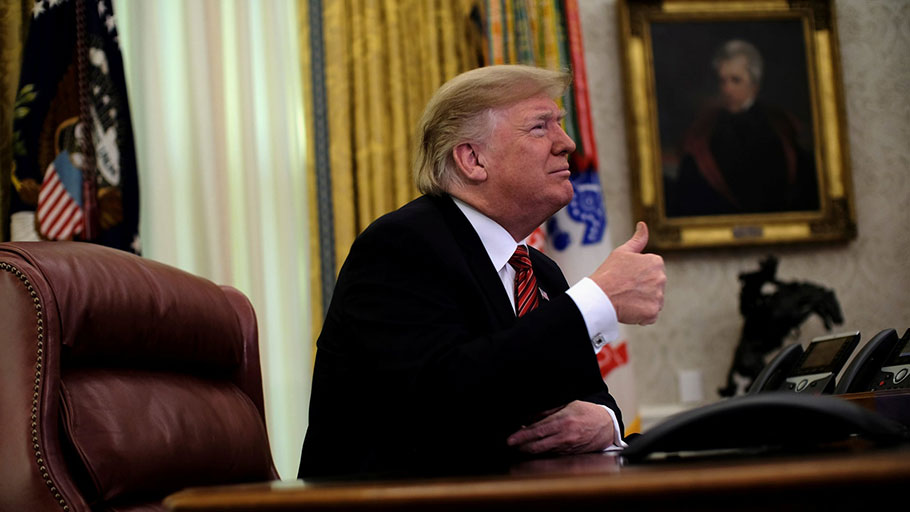
Trump has given himself an A+ rating during his first two years as president. Photograph: James Lawler Duggan/Reuters
Neil Sroka, communications director of the progressive group Democracy for America, also finds consolation in the country’s response. “A giant Trump-shaped cloud sits over everything, but the silver lining is that the rise of this administration has led to a progressive awakening that had been thought of as possible but not guaranteed,” he says. “What many folks have realised is how fragile institutions are and in a lot of ways Trump himself hasn’t rotted the trust, but the wrecking ball Trump has been to our democratic norms has exposed the rot that lay beneath the surface.”
Race has been at the core of the Trump presidency, just as it is at the core of America. Sroka adds: “In January 2017, we had millions of white liberals running around saying this isn’t our country and what the last two years have shown is that, yes, this is our country and the only way we’re going to fix it is to fundamentally change our politics.”
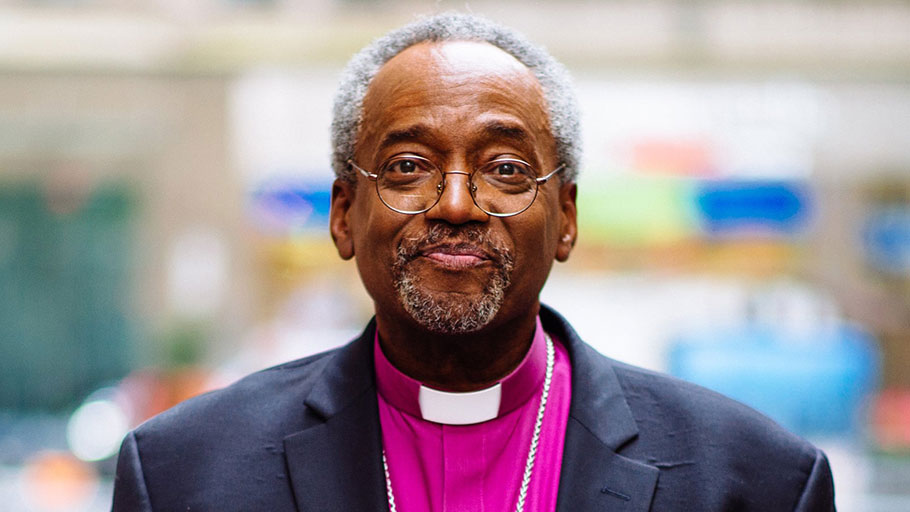
Bishop Michael Curry: ‘Tough times don’t last always.’ Photograph: NBC/Getty Images
Trump is as American as Obama. His presidency has laid bare America’s soul and shaken its oldest institutions, including the church. Michael Curry, presiding bishop and primate of the Episcopal church, says: “I think in most folks there’s a sense that something’s out of kilter. We don’t know exactly what, and that’s not a liberal or conservative thing, but there’s something in the way we’re even engaging each other.”
Curry, 65, who shot to fame at the wedding of Prince Harry and Meghan, says he is now having more conversations with members of Congress and people in government about spiritual values. Despite it all, does he remain optimistic? He pauses and leans back, then replies: “I believe in hope. I believe in God. This isn’t the first time the human race has been in trouble and I expect it won’t be the last.
“We’re in the midst of some tough times right now but like the old slaves used to say, tough times don’t last always. As long as there’s a God.”

